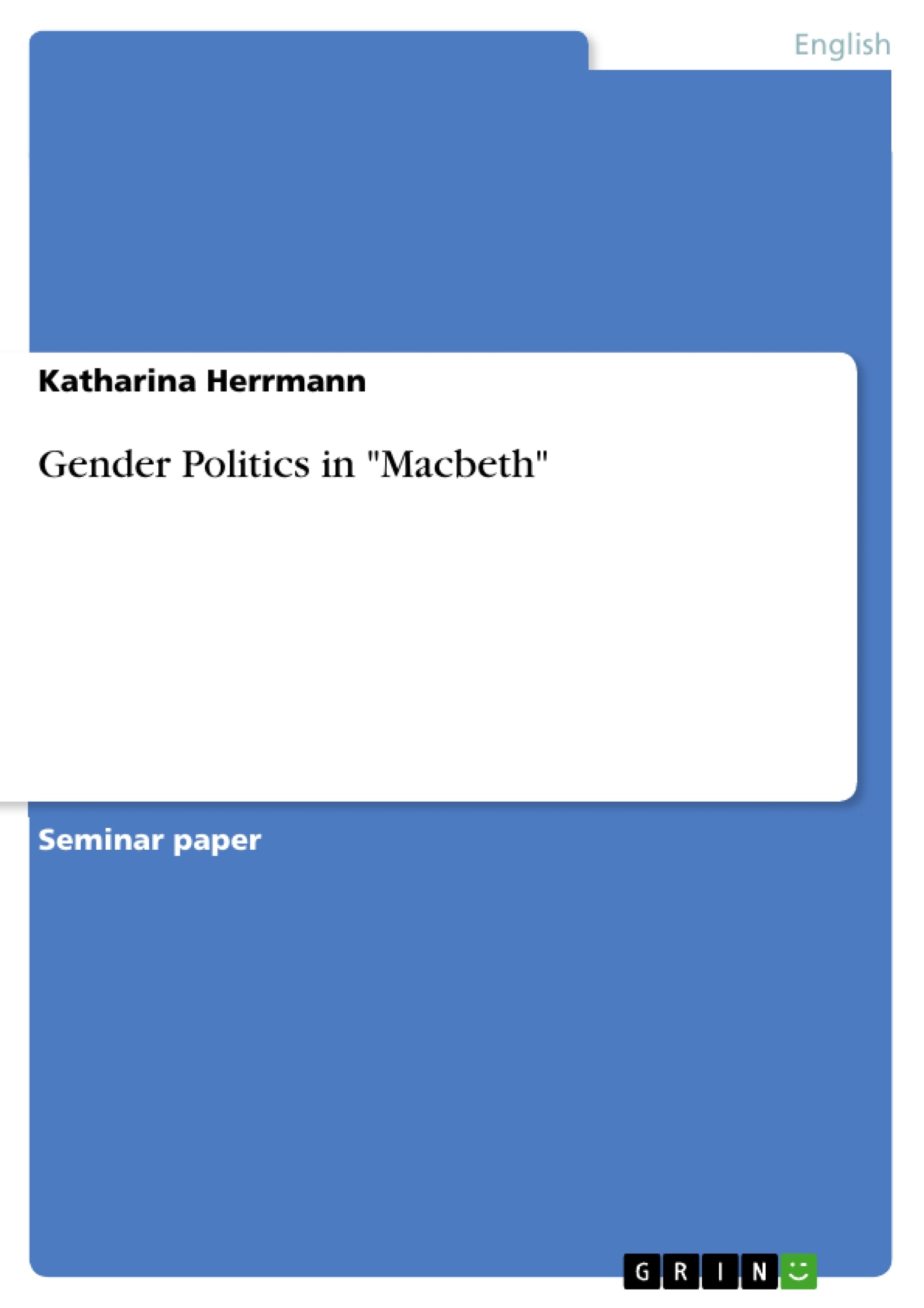Renaissance tragedy does to a large extent deal with common political, religious and social questions of the time. In most cases, authors use tragedy as the place to question and even criticize those issues, and thus use it as a political space. In Jacobean England, society was profoundly hierarchical with the king on top of the state, and the father or husband as head of the family. “[W]omen were clearly socially subordinate, and the preponderance of discourse on the gender hierarchy was misogynistic” . Macbeth is one of Shakespeare’s late tragedies, written in 1606, and presented at the Globe Theatre later that year. In Shakespeare’s plays sex and gender are crucial for defining human identity and political power.
In the course of this essay, I will first take a closer look at gender ideology in the English Renaissance and in Renaissance tragedy and see how society justified the social subordination of women, and what kind of behaviour was considered appropriate for women. As Macbeth is a play that hugely builds on gender stereotyping, I will afterwards work out the play’s definition of masculinity and femininity in the medieval social context the tragedy is set in, and subsequently analyse the characters of the three witches and king Duncan regarding their hermaphroditism and androgynity, and see whether the blurring of fixed gender roles might be interpreted as an indication that gender politics in Macbeth are unusual for the medieval Scottish context. The main part of this essay will be dedicated to the Macbeths, two strongly individualized characters. I will examine the characters of Lady Macbeth and Macbeth first, take a look at how their ambition leads to their downfall and afterwards discuss whether it is possible to talk about an inversion of the traditional gender roles since especially Lady Macbeth oversteps the boundaries of appropriate female behaviour and is, at least in the beginning, the more powerful character of the two spouses.
Inhaltsverzeichnis (Table of Contents)
- I. Gender Politics in Macbeth
- Introduction
- II. Gender ideology
- 1. Gender ideology in the English Renaissance
- 2. Gender ideology in Renaissance tragedy
- III. Gender stereotyping in Macbeth
- 1. Masculinity
- 2. Femininity
- 3. Blurring of categories
- IV. Gender conflict in Macbeth
- 1. Lady Macbeth, the “fiendlike queen”
- 2. Macbeth, the \"butcher”
- 3. Macbeth - an inversion of gender roles?
- V. Conclusion
Zielsetzung und Themenschwerpunkte (Objectives and Key Themes)
This essay aims to analyze the gender politics present in Shakespeare's Macbeth. It delves into the social context of the English Renaissance and how gender ideology shaped the roles and expectations of men and women, particularly within the play's setting of medieval Scotland. The essay explores the traditional definitions of masculinity and femininity in Macbeth, paying close attention to the characters of Lady Macbeth and Macbeth themselves.
- Gender ideology in the English Renaissance
- Gender stereotypes in Renaissance tragedy
- Masculinity and femininity in Macbeth
- The portrayal of Lady Macbeth and Macbeth
- The potential inversion of gender roles in the play
Zusammenfassung der Kapitel (Chapter Summaries)
The first chapter introduces the concept of gender politics in Renaissance tragedy and its reflection in Shakespeare's Macbeth. It highlights the hierarchical societal structures of the time, placing women in a subordinate position to men.
The second chapter delves into the specific gender ideology prevalent in the English Renaissance. It examines how the Bible, the Church, and various societal norms upheld the patriarchal hierarchy and defined appropriate female conduct as submissive and obedient.
The third chapter focuses on the play's depiction of masculinity and femininity, using the characters of Macbeth and Lady Macbeth as examples. It explores how the play itself defines the norms and conducts of appropriate male and female behavior.
Schlüsselwörter (Keywords)
This essay explores the themes of gender politics, gender ideology, masculinity, femininity, and gender roles in Shakespeare's Macbeth. It analyzes the characters of Lady Macbeth and Macbeth, their ambitions, and their impact on the play's narrative. The essay also considers the societal context of the English Renaissance and its influence on the play's portrayal of gender.
- Quote paper
- Katharina Herrmann (Author), 2008, Gender Politics in "Macbeth", Munich, GRIN Verlag, https://www.grin.com/document/163079




